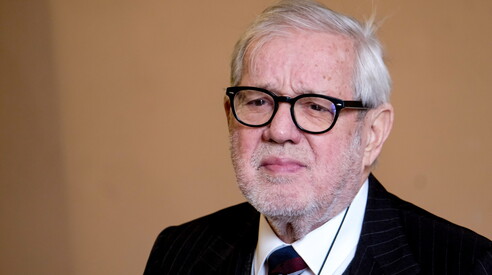Milan and beyond. What it means to criminalize politics by betting on a culture of suspicion. Interview with Flick


Photo LaPresse
The interview
"When justice stops dealing with verified facts and begins to address suspicions, theories, and phenomena, focusing on consensus, a problem arises." The dismay in the "republic of judges and prosecutors." A chat with the jurist and former Prodi minister
On the same topic:
Giovanni Maria Flick is a prominent Italian jurist. He served as Minister of Justice in the first Prodi government and was President of the Constitutional Court between 2008 and 2009. He is a man of the left, a jurist who grew up in a progressive world, but for years, discreetly but decisively, he has been waging his own cultural battle to confront politicians, both right and left, with a necessary truth: the damage wrought by a republic founded on the overflowing judiciary. Flick agreed to engage with Il Foglio on this topic, in a frank, sincere, and surprising manner, bringing together three seemingly very different elements .
The first element concerns the labor investigations conducted in Milan by a well-known prosecutor, Paolo Storari, although Flick never names him out of sensitivity. The second concerns the investigations into urban planning conducted in Milan by the same prosecutor's office, which yesterday also led to an investigation against Mayor Giuseppe Sala. The third element concerns the sensational and underappreciated reasons filed by the Supreme Court of Cassation regarding a fatal bus accident in Avellino in July 2013. The common thread Flick sees in these stories is part of a problem close to this newspaper's heart. Italy, Flick says, has chosen to watch the judiciary's overreaching with indifference . By watching these overreaching with indifference, it has created a vacuum, a space, within which politicians have agreed to grant the judiciary powers beyond their proper scope. The judiciary has often filled these voids by transforming the culture of suspicion into the driving force of the Italian justice system. And the inability of politicians to reclaim that space has created a huge problem: the presence of a judiciary that doesn't limit itself to dealing with crimes but chooses to address phenomena, thus allowing its actions to be dominated by an objective no longer tied solely to compliance with the penal code and its guarantees regarding law, crime, personal responsibility, and punishment, but rather tied to a dangerous respect for the code of ethics. The penal code, we know, allows for limited discretion. The prevention code, on the other hand, allows for unlimited discretion. According to Flick, the excessive use of preventive measures, such as judicial administration without a proven crime, poses a problem for the country because it undermines the principle of legality, replacing legal certainty with suspicion, and because it allows, as has happened in Milan with many investigations, "a shift from the repression of criminally relevant facts to interventions on phenomena based on contextual judgments, perceptions of risk, or ethical-social purposes." This approach, says Flick, "exposes businesses to anticipated and indeterminate liability, discourages investment, introduces uncertainty into economic relations, and entrusts the judiciary with oversight functions that should be the responsibility of politicians." Furthermore, "criminal law thus becomes a tool of preventative moralization, with distorting effects both on responsibility and business freedom, and on the protection of fundamental rights."

The decision to place Loro Piana under judicial administration based on a creative interpretation of the right to work— Loro Piana, according to the Milan prosecutor's office, failed to implement adequate measures to verify the actual working conditions of its contractors—is, according to Flick, a textbook case and demonstrates exactly what the jurist criticizes: the use of criminal law in a preventive and discretionary manner . The company is not accused of exploiting workers, but of failing to adequately monitor a supplier. This is the logic of "culpable facilitation," which punishes without intent, only for presumed environmental misconduct. And within this logic, measures such as seizures or judicial administration become preemptive sanctions, prior to a trial. According to Flick, we move from a proven crime to a contextual judgment, where the judiciary intervenes to moralize the system rather than apply the law. And all of this undermines the principle of legality, generates legal uncertainty, harms businesses, and discourages investment. The net effect is a symbolic criminal law that replaces politics and weakens the rule of law. "An approach born for anti-mafia prevention measures is being applied, with a certain general satisfaction. Those measures were originally designed to monitor individuals, then these measures have expanded over time and developed as tools to monitor mafia infiltration into apparently healthy society . The problem is that these measures provide very few guarantees: they are applied not in the presence of a crime committed, but based on the presumed dangerousness of the individual. They are not security measures following a crime, but rather tools that act on suspicion. This has led to an expansion of the very concept of 'prevention' and an increasingly marked shift towards the patrimonial level. Over time, prevention measures have become increasingly patrimonial: we look at where the money comes from and where it goes. The current paradox is that prevention measures are applied to money regardless of who receives it, with a pervasive logic of control. And in the Milan case, for example, extensive prevention measures, such as judicial administration, are exercised even when There is no proof of a crime . And when a mechanism is created in which, by applying prevention rules, one arrives at seizure or judicial intervention in the absence of confirmed crimes, one looks more at the final result or at everyone's consent, complicit in the 'forced acquiescence' of the person under investigation.
The second point close to Flick's heart concerns another sensitive issue that has affected Milan in recent days: the investigations being conducted by the prosecutor's office into urban planning . Unlike the previous case, Flick says, this issue raises a fundamental issue. Constitutional law dictates that a crime must be foreseen by law before it is committed, and that it must not be overly creative. And in urban planning, the alleged crimes, in some cases, exist, are understandable, and are clear. It's not a question of whether those under investigation are truly guilty—time will tell—but rather of distinguishing between a magistrate who deals only with phenomena and one who also deals with facts. But here too, Flick says, there is a risk. And it's clear: the danger of a judicialist vision taking hold, which ends up criminalizing urban planning policy as such. Flick observes that Parliament often intervenes with "authentic ex post interpretations" to legitimize urban planning decisions already made, with the risk of bending the law to the needs of controversial projects. The transition from planning to judicial investigation, however, often occurs in a confusing and fragmented regulatory context, which fails to distinguish sufficiently between questionable decisions and unlawful behavior. And when the judiciary overextends the boundaries of criminal law to fill gaps in politics or the law, "there is a risk of replacing democratic decision with suspicion." A clear line of defense, however, is necessary: "It's one thing to address a potential political crime; it's another to criminalize the profession of politics."
The third point addressed by Flick concerns the recent Supreme Court ruling (two days ago) on the case of the bus without brakes that crashed due to a defective guardrail in Avellino in 2013. In that ruling, Flick says, the Supreme Court established the liability of the company's top management, redefining the concept of "business organization" very broadly—perhaps too broadly. The risk, Flick says, in cases like these "is that we move from liability based on fault to strict liability: you are no longer liable only if you acted with intent (i.e., intention) or through fault (i.e., through negligence or incompetence), but also if you simply contributed, remotely or indirectly, to a damaging event. This is a dangerous logic, because it introduces elements of liability not tied to direct behavior or a violation of rules, but to an abstract legal construction of risk ." The question is clear, and it's the same one our own Ermes Antonucci posed months ago on these pages: "How was it possible that justice ended up attributing responsibility for the collapse of a viaduct guardrail to the CEO of a company with nearly ten thousand employees, managing approximately 2,800 kilometers of highways? "When the guiding principle of justice becomes one of 'it couldn't have failed to know, it couldn't have failed to monitor, it couldn't have failed to be aware,' the risk is that a concept of justice emerges that stops dealing with verified facts and begins to concern itself with suspicions, theories, and phenomena. This, among other things, testifies to the mutual ignorance that exists between the company, its organization, and the magistrate's activity ."
Flick concludes: “There is a story I often tell to those who are approaching the world of justice and to those who try to understand what mistakes should be avoided when reasoning about this world. It is the story of a grandfather who administers justice under the tree. That grandfather one day chooses to bring his grandson under the tree. And with his grandson he begins to judge a case. A contender arrives and after a few minutes of discussion the grandfather says: 'You're right, go ahead.' The opponent arrives and after a few minutes he also says to him: 'Go ahead, you're right.' The grandson doesn't understand and asks: 'Grandpa, how can everyone be right? Nothing is clear.' The grandfather thinks about it for a while and responds by saying: 'That's right, you're right too.' Moral of the story. Justice must return to discussing concrete facts, it must ensure it is not exploited , it must learn to judge without being caught up in the desire to gain widespread consensus, and politics must learn to recognize when there is a Justice based on facts, and justice that deals with phenomena, that is, ethics. It's hard work, but it's the essence of our democracy. It's worth thinking about and maybe even trying.
More on these topics:
ilmanifesto





